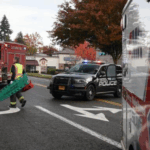PORTLAND, Ore. (KGW) — The aisles at Sunshine Division’s food pantry on Southeast Stark Street were already crowded by midmorning Tuesday. Volunteers moved quickly, loading boxes with canned goods, fresh produce, and bread. Normally, that kind of rush would signal a busy day — but this time, it reflected something deeper: a wave of desperation spreading across Portland as the federal government shutdown freezes SNAP (Supplemental Nutrition Assistance Program) benefits.
More than 750,000 Oregonians rely on SNAP each month to afford groceries. With payments paused indefinitely, families across the state are struggling to make ends meet, and food pantries like Sunshine Division are overwhelmed with demand.
Families Facing an Uncertain Future
Among those waiting for food Tuesday was Tamra Orr of Gresham, a former professional who lost much of her income during the pandemic.
Also Read
“It’s been very, very hard,” Orr said. “I kind of had to be pulled kicking and screaming to do it because, in the past, we did pretty well. Then my profession hit bottom with COVID, and I went from six figures to a lot less.”
Like millions nationwide, Orr hasn’t seen her SNAP card reload since November began. For her, that means cutting meals short, stretching what little she has, and relying on community food programs to feed her family — including her young grandson.
“I’ve got a three-and-a-half-year-old grandson, and I worry,” she said. “We give a lot of what we get to them because we want to help. Food insecurity is something I never could’ve imagined us facing.”
Mixed Messages from Washington
Confusion deepened Monday after the White House announced it would use an emergency contingency fund to partially fund SNAP, following a judge’s order. However, the next morning, President Donald Trump appeared to reverse course, posting on Truth Social that benefits would resume “only when the Radical Left Democrats open up government.”
The post sparked nationwide outrage and fear among recipients. Hours later, White House press secretary Karoline Leavitt clarified that the contingency funds are being used but emphasized that the resource is limited and not sustainable.
“We are digging into a contingency fund that is supposed to be for emergencies, catastrophes, for war,” Leavitt said. “The president does not want to have to tap into this fund in the future, and that’s what he was referring to in his post.”
Oregon Food Banks at a Breaking Point
Back in Portland, Sunshine Division Executive Director Kyle Camberg said his team is stretched to its limit. Demand has soared to levels the nonprofit has never seen.
“We’re trying to do everything we can, but this is a crisis,” Camberg said. “We’re at a tipping point where the social service network can’t make up for what the federal government does. It’s beyond alarming and disturbing what we’re seeing.”
Camberg said the pantry’s home delivery program filled up in hours, and nearly 2,000 families registered for holiday food boxes in a single day — a process that usually takes weeks.
He gestured toward pallets stacked with canned food and dry goods. “This looks like a lot of food,” he said, “but when you’re seeing three, four, five times as many people as you normally do, this food will be gone in 48 hours.”
State Leaders Respond
As food insecurity worsens, state officials are scrambling to help. Governor Tina Kotek recently declared a statewide food emergency and redirected $5 million in state funds to bolster food banks while federal support remains uncertain.
Meanwhile, Sen. Ron Wyden (D-Ore.) blasted the administration’s handling of the SNAP freeze, calling it “shocking” and “plain wrong.”
“Playing games with the food on the tables of vulnerable families is just plain wrong,” Wyden said. “It’s shocking that that’s what an administration would do in Washington, D.C.”
Wyden said Congress must find a bipartisan way to restore funding before “millions of Americans fall deeper into hunger.”
Community Kindness, but Limited Resources
For families like Orr’s, community efforts have been a lifeline. Local restaurants, churches, and neighborhood groups have begun offering free meals and food drives. Still, volunteers say donations can’t keep pace with the growing need.
Orr said she’s deeply grateful for the outpouring of support — but worries it won’t last if the shutdown continues.
“People are being incredibly generous,” she said. “But everyone’s stretched thin. You can feel it.”
Hunger as a National Wake-Up Call
Experts warn that the crisis in Oregon is just one part of a nationwide breakdown in food security systems tied to the shutdown. Even short delays in SNAP funding can lead to surges at local pantries, leaving many families with no safety net.
For now, Camberg said, the Sunshine Division will keep operating “as long as there’s food on the shelves.” But without clear action from Washington, the future looks bleak.
Standing by her car as volunteers loaded her food box, Orr reflected on the situation — and the resilience of her community.
“We’ll find ways to help each other,” she said quietly. “We just hope it’s enough, because we’re not going to get it from the government — that’s for sure.”












